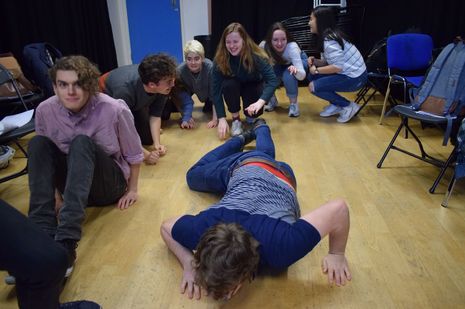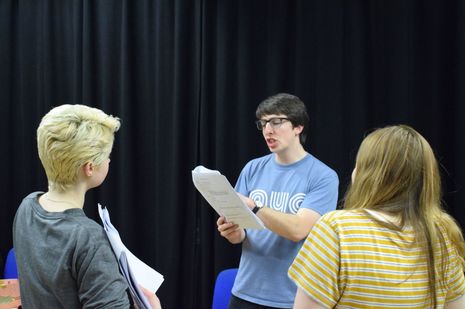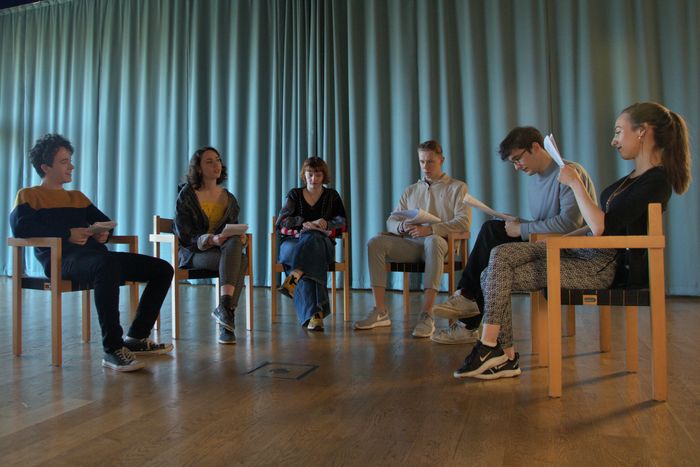Gleeful, chaotic fun in Cymbeline: The Musical
Joe Venable explains how his musical adaption of Shakespeare’s weirdest play embraces the oddities and messiness of its source material

If William Shakespeare was alive today, I think he’d be writing musicals. It’s virtually the only present-day form able to sell tickets across the class spectrum, attaining critical acclaim and popular affection. The musical is today what the play was in 1611, even as today’s non-musical theatre persistently fails to appeal to a wider and diverse audience.
Of course, my hypothesis is a little absurd: Shakespeare did write musicals. All his plays are written at least partly in verse, often rhyming verse, and most contain a song or two. And indeed, the very style of Shakespeare’s plays, where characters turn to the audience to express their deepest feelings in asides and soliloquies, resembles the bursting-into-song that the musical loves to employ.
We’ve tried to take the best parts of Cymbeline – the wager plot, the quirky characters, the scrumptious imagery – and distill it into a 75 minute rollercoaster.
The more reason, then, for converting Shakespeare into its most fitting contemporary form. In my life, I’ve seen a lot of original-language Shakespeare done badly, and heard a lot of people complain it’s what put them off drama, or even literature. And I can see why. Watching actors try and put on a play like Cymbeline in a modern, naturalistic style always leaves me intensely perplexed: that’s not what it was intended for, it seems hard to believe it’s bringing anyone pleasure, and I struggle to understand why it was ever attempted in the first place.
The way the musical eschews realism brings much-needed lubrication to dialogue that often chafes and jars when performed too dryly. And Cymbeline seems to adapt particularly well – with its larger than life characters, its crazily heightened sentiment, and its utterly preposterous, never-realistic plot twists.

Admittedly, we’ve stripped big chunks of that out. Here at Cymbeline: The Musical, we don’t believe in boring sub-plots, nor in keeping you at the theatre for longer than a normal human being can go without a wee (at full length, Cymbeline runs close to four hours). We’ve tried to take the best parts of Cymbeline – the wager plot, the quirky characters, the scrumptious imagery – and distill it into a 75 minute rollercoaster.
We’ve made some other changes too. Cymbeline is called a “late play”, which basically means it’s weirdly nice; scholars talk about how elderly Shakespeare had a kind of softness for the young people in his plays, a “tender bending over” the next generation. This is all very pleasant, but niceness is also boring; Cymbeline’s body count is pitiful. Worse, it means various villains don’t get their comeuppance, which is sad given how utterly dastardly they are. Cymbeline: The Musical guarantees your money back if you aren’t satisfied all baddies have been fed their just desserts, in the bounciest, most gleeful way possible.

We’ve also had to address the play’s misogyny; characters in Shakespeare’s text make bets over women, order them brutally murdered for infidelities, and worse. As a creative team, we’ve wrestled at various times with this but ultimately felt that we couldn’t shy away from presenting Jachimo and Posthumus as misogynistically as Shakespeare does. To try and show the locker room and the death threat without using the language of the locker room and the death threat seemed strange and untrue. We did take out the nastiest story-line, involving Cloten and Imogen – but there are still themes in there unusually dark for a musical. Still, without meaning to ruin the ending, I’m hoping no-one will leave the theatre without feeling toxic masculinity has been roundly rejected.
Lastly, we’ve made a great change to the cast. If you never really enjoyed seeing Richard Burbage or Edward Alleyn in the big Shakespeare roles, you’re going to love our gang, from Georgie Deri’s feisty Imogen to Vicky Chiu’s magnificently evil Queen. Our set and costume are also gorgeously conceived, by Em Jones and Jonathan Powell respectively, setting the play in the present but with the occasional anachronistic touch (the odd top hat, scroll, etc) to try and reproduce the jarring sense of artifice you get from reading Cymbeline. Above all, we’ve tried to find the comedy amidst the strange storyline of Shakespeare’s play. Whether it’s Imogen’s sass, Jachimo’s bawdiness or Cymbeline’s ineptitude, there is plenty of laughter available in Cymbeline. In fact, it might be the best way to guarantee the Bard would approve. Putting form aside, if Shakespeare was alive today, he would definitely be making people laugh – with songs or without. It doesn’t feel quite right to call Cymbeline: The Musical a comedy – it straddles too broad a spectrum of genres – but I’m hopeful everyone will leave with a smile on their faces. And a renewed appreciation for the fidelity of their loved ones.
 Comment / Plastic pubs: the problem with Cambridge alehouses 5 January 2026
Comment / Plastic pubs: the problem with Cambridge alehouses 5 January 2026 News / Cambridge academics stand out in King’s 2026 Honours List2 January 2026
News / Cambridge academics stand out in King’s 2026 Honours List2 January 2026 News / Cambridge businesses concerned infrastructure delays will hurt growth5 January 2026
News / Cambridge businesses concerned infrastructure delays will hurt growth5 January 2026 News / AstraZeneca sues for £32 million over faulty construction at Cambridge Campus31 December 2025
News / AstraZeneca sues for £32 million over faulty construction at Cambridge Campus31 December 2025 Interviews / You don’t need to peak at Cambridge, says Robin Harding31 December 2025
Interviews / You don’t need to peak at Cambridge, says Robin Harding31 December 2025









